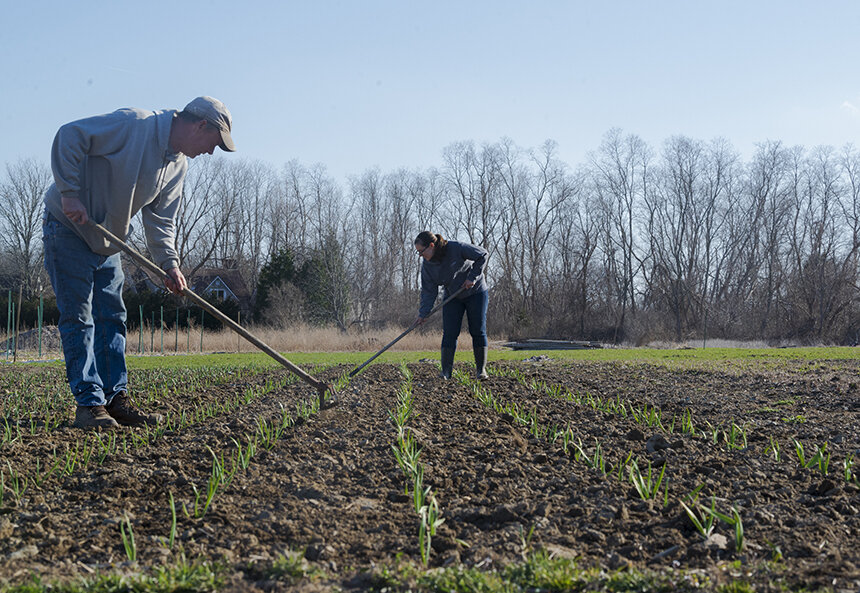New Providence Seed Library Offers Array of Growing Options with Cultural Resonance
May 27, 2021
PROVIDENCE — Fatema Maswood recalls her mother’s stories about family lands in North Africa on which her grandfather and those who came before him farmed, and how they lost them to colonization.
Maswood keeps heritage in mind while selecting seeds representing crops from underrepresented cultures and regions for distribution through a new seed library cultivated for the Providence Community Library system of nine neighborhood libraries.
The artist in residence in the city’s Office of Sustainability has built a collection of more than 250 seed varieties now available to Rhode Islanders who want to use their yards and community gardens to expand the offerings on their tables beyond what is available at grocery stores.
Maswood said she believes seeds can be part of a movement toward food equity for people of color and disenfranchised communities.
By providing greater access to the foundational component of plant life, Maswood hopes to add fuel to a movement of “seed sovereignty,” helping communities nourish themselves without being restricted to patented seed lines or the limited selection of foods provided by some retailers.
Maswood, who holds a master’s degree in landscape architecture from the University of Washington, already possessed a “huge stockpile of seeds” she wanted to use in a beneficial way by sharing them with other active gardeners and those interested in growing. She also found donations by cold calling and emailing individuals and seed companies she respected for their products and ethics.
The project aims to provide pollinated heirloom seeds — those from plants passing on the same essential characteristics from year to year — that can foster biodiversity by introducing a wide variety of food crops able to adapt to the regional ecosystem.
“I’m not a botanist,” said Maswood, who called herself a “plant person” and educator dedicated to grassroots work. “My focus is in the communal process of growing and sharing seeds.”
The seeds are provided at no cost and can be found in the Ocean State Libraries online catalogue using the same classification and search system through which patrons access books, magazines and other loan items.
The seed packets are available at the Washington Park, Knight Memorial and Mt. Pleasant branch libraries. The small envelopes include between 10 and 30 seeds each depending on the variety and are accessed with the aid of the branch librarians, who Maswood said have offered tremendous support and assistance with a project requiring significant dedication.
“It’s definitely pretty time consuming,” said Maswood, who fills packets with the help of volunteers and friends. The size of the collection has required hours of work attaching labels to at least 2,000 packets.
Maswood is nearing the end of the nine-month artist residency but plans to continue working on the seed library after leaving the post, which is a collaboration between the city’s sustainability office and Department of Art, Culture + Tourism. An online summary says the role is one of the strategies for fulfilling the city’s Climate Justice Plan, which “aims to create an equitable, low-carbon, and climate-resilient” city through policies and initiatives.
“I’ll stay a part of it because it’s really important work to me,” said Maswood, who is developing a website to highlight the collection. “I’m very optimistic about bringing more people in to continue the project.”
The library collection holds seeds for eggplants, beans, peppers, cumin, borboti, data shak, mlokhiya, felfel, luffa gourd and many others, including seeds indigenous to Rhode Island’s Native American tribal lands.
Cowpeas are a notable offering because of their connection to the agricultural heritages of the southern United Stated and Africa, Maswood said. The cultural resonance of the chosen seeds has been central to the effort to provide starter tools for new gardeners and gardeners of color to grow their own crops.
Part of the cultural significance is the political nature of seeds, Maswood said. They offer a break from what she characterized as a huge percentage of seed lines held under patents and food crops linked to a history of small farmers being pushed off their land.
“I think it’s part of a much larger story about colonization,” said Maswood, who is of Tunisian and Bangladeshi descent.
Seeds obviously can’t be returned like library materials intended for temporary consumption, but Maswood said patrons are asked to replenish the collection with seeds from the plants they eventually produce to continue the expansion of community food sources and cultural awareness.
“I think it’s something really profound and really special to be able to grow that food,” Maswood said.



